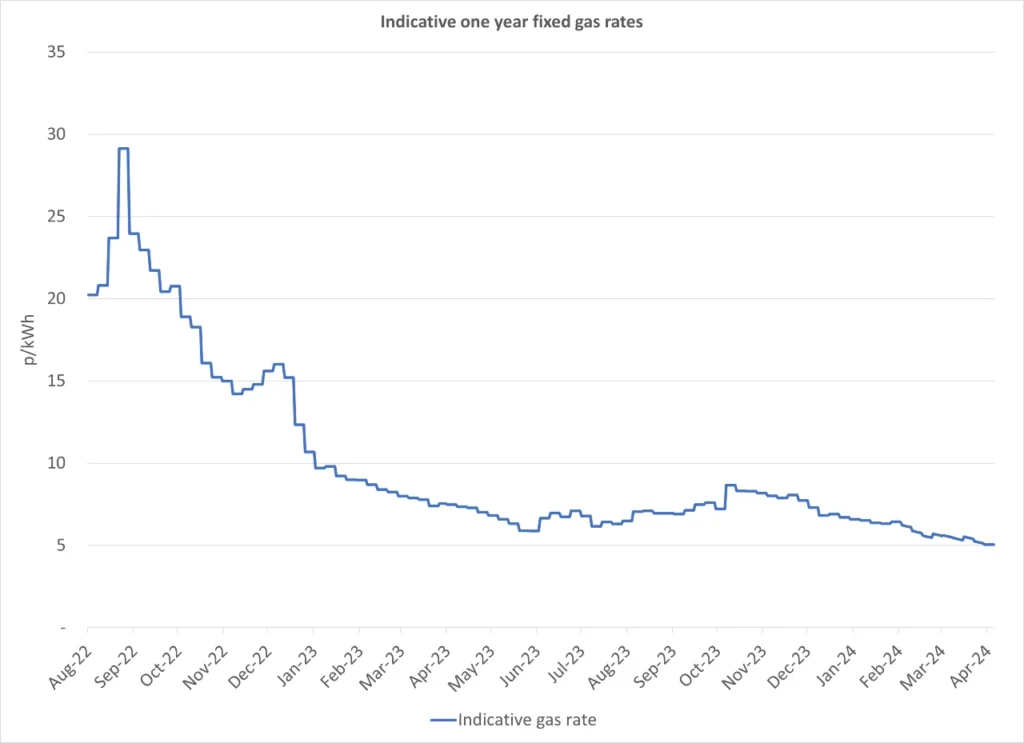
Take Advantage of Falling Business Energy Rates
- Receive competitive quotes in minutes
- Compare trusted UK Suppliers
- Best Fixed Rates from our Experts
Over 100 energy suppliers compete in the market to offer the best business energy tariffs. Use our business energy comparison service to quickly find the best deals
Over 100 energy suppliers compete in the market to offer the best business energy tariffs. Use our business energy comparison service to quickly find the best deals

Source: Wholesale energy rates on the National Grid published on the ICE exchange.
Energy analysts at Cornwall Insights predict that wholesale energy prices will continue to fall gradually through 2024. With the energy market becoming more favourable, suppliers are reducing their one-year fixed energy prices.
Compare business energy prices – April 2024
Government support and business energy comparison
In response to the energy crisis, the government introduced two schemes to support UK businesses:
- Energy Bill Relief Scheme (October 2022 to March 2023) – Generous unlimited automatic discount scheme to cap business energy bills.
- Energy Bill Discount Scheme (April 2023 to March 2024) – A smaller discount of 2p per kWh for electricity and 0.7p per kWh for gas, applicable to the most expensive tariffs.
💡Both government support schemes have now concluded and have not been extended.
With the absence of government support, securing competitive energy rates from the market has become crucial.
Compare business energy quotes
Use our business energy comparison service to swiftly receive tailored quotes from our panel of trusted business energy suppliers.
We assist businesses in finding the best business energy quotes and making savings with a simple business energy switch. The energy comparison and switching process varies depending on the size of your business, but our experts are always on hand to assist at each stage.
Energy comparison for large businesses
Energy comparisons for large businesses require bespoke quotes, which can take a little longer to arrange but address specific needs such as:
- Multi-site energy meters – Where more than one property is included within a business energy contract.
- Maximum demand charges – An additional charge levied by your local distribution network operator to guarantee an agreed capacity for your business energy connection.
- Half-hour meters – Business energy meters that record consumption every half an hour, facilitating multi-rate tariffs.
Despite the additional steps, our experts are dedicated to supporting you throughout the comparison process for large business energy.
Small business energy comparison
Business energy is a significant overhead for most small businesses, so reducing your unit rate by even the slightest margin will help you save money.
The regular Ofgem gives additional rights to smaller businesses to make it easier to compare business energy prices and avoid expensive deemed contracts.
For these businesses, a commercial energy supplier must:
- Show your contract end date and notice period on all bills.
- Allow you to submit a notice of contract termination at any time during your contract.
Business energy suppliers offer simple fixed tariffs for smaller businesses that can help you quickly and easily reduce energy bills. For more information, check out our guide to small business energy.
Compare renewable business energy
Renewable energy for businesses is getting cheaper each year as green technologies improve. The additional cost of a green energy tariff is getting ever closer to the price of a standard business energy tariff.
A few of the biggest energy suppliers now provide renewable energy as standard in their small business tariffs.
To get the latest renewable energy prices, enter your details in our business energy price comparison tool. Our business energy experts will automatically collect quotes from green energy suppliers for you to compare.
What is the average business energy bill?
Business energy bills vary wildly in size. Small hairdressers will pay a few hundred pounds monthly; an aluminium smelting plant will pay millions. The key point here is that businesses pay for each kWh of energy used, and these consumption charges make up the biggest part of business energy bills.
According to the most recent government statistics, the average business is paying between 27 and 30 pence per kWh on its energy bills. This average, however, disguises significant differences from one business to another. There are broadly three scenarios:
- Businesses that agreed to fixed contracts in the second half of 2022 will be paying much higher than these rates and up to as high as 100p/kWh.
- Businesses on older fixed contracts that pre-date the energy crisis could be paying as low as 11p/kWh.
- Businesses on standard variable default rates will be paying unfavourable rates that could be as high as 40p/kWh. These can make significant savings by comparing business energy rates today.